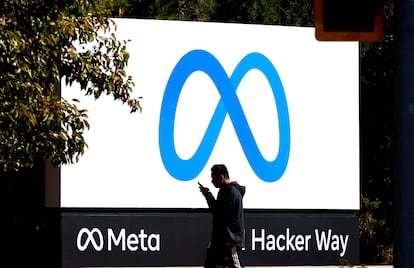What Meta, Google and other tech giants are doing about Russia’s invasion of Ukraine
Faced with growing pressure to take action as providers of critical online services, some companies have announced restrictions on Russian state-affiliated media

The invasion of Ukraine has placed the world’s tech giants at the center of the battle between Russia and the West for information management. Companies are taking steps to avoid spreading fake news and sensitive data that could compromise the security of Ukrainian citizens, particularly after Ukraine’s first vice prime minister, Mykhailo Fedorov, asked Silicon Valley for help in standing up to the Kremlin’s gigantic propaganda and espionage machine.
The US giant Meta (owner of Facebook) and the Chinese video platform TikTok announced they would block access to the state-affiliated media outlets Russia Today (RT) and Sputnik across the European Union after the latter asked for support in fighting Russian misinformation. The move came on the back of pressure from EU authorities, US politicians and employees from some of the companies themselves, which are bracing for Russian reprisals over what Moscow views as censorship.
Apple on Tuesday said its App Store would no longer offer downloads of RT News and Sputnik News outside Russia. The company has also stopped selling its products in Russia. And Google has stopped displaying real-time traffic information inside Ukraine on Google Maps (to prevent the Russian army from finding out the location of civilians) and Twitter has temporarily paused ads in Russia and Ukraine.
Here is a rundown of what each tech company is doing:
On February 24, Russian President Vladimir Putin gave the order to invade Ukraine. That same day, a team of researchers in California detected Russian troops entering the neighboring country hours before the news became public thanks to Google Maps, according to The Washington Post. Google uses cellphone locations to show traffic jams and how busy a store or business is at a given time. While this kind of data can display information about the advancing invasion, it could also show information about Ukrainian civilians. To protect citizens, Google has stopped displaying real-time traffic information on Google Maps.
The tech giant has also banned monetization across all its services for Russian state-affiliated outlets, and said it is blocking ads related to the crisis “that seek to take advantage of the situation.” On YouTube, the company said it has eliminated hundreds of channels and thousands of videos that violate its policies. “Also in response to a government request, we restricted access to RT and a number of other channels in Ukraine. We will continue to monitor new developments and may take further action,” said Google Europe in a statement.
Last week Twitter blocked several accounts informing about the conflict in Ukraine. The ensuing criticism led the company’s security chief, Yoel Roth, to blame the move on “a small number of human errors.” A few days later, the company said its top priority is “keeping people safe” and that it was monitoring the risks associated with the Ukraine conflict.
Twitter has also temporarily paused ads in Ukraine and Russia, and will label tweets that share links to Russian state-affiliated outlets. The company said it is proactively reviewing tweets to detect any attempt at manipulation and take action against fake multimedia content.
Meta
Russia has partially restricted access to Facebook after accusing the company of censoring its media channels. Nick Clegg, president for global affairs at Meta Platforms, gave his version on Twitter: “Yesterday, Russian authorities ordered us to stop the independent fact-checking and labelling of content posted on Facebook by four Russian state-owned media organizations. We refused. As a result, they have announced they will be restricting the use of our services.”
Meta has confirmed that its social networks – which include Facebook, Instagram and WhatsApp – will restrict access to RT and Sputnik across the European Union following a petition by EU leaders.
These outlets will also no longer be able to monetize their content. And a new tool in Ukraine will give users the ability to lock their Facebook profile, blocking users who are not friends from downloading or sharing their profile photo or seeing posts on their timeline. “We’ve previously deployed this tool elsewhere around the world to help protect people in situations that are unsafe, including Afghanistan,” tweeted Nathaniel Gleicher, head of security policy at Meta.
The company has set up a special operations center staffed by experts, including native Russian and Ukrainian speakers, “who are monitoring the platform around the clock.”
Apple
Apple said on Tuesday it was halting all product sales in Russia and limiting access to Apple Pay and other services. The company also said its App Store would no longer offer downloads of RT News and Sputnik News outside Russia. Traffic information and other live data are no longer being displayed on Apple Maps in Ukraine as a safety measure.
Other companies
Starlink, the satellite internet network operated by SpaceX, has been deployed in Ukraine after company chief Elon Musk received the following tweet from Fedorov: “While you try to colonize Mars – Russia try to occupy Ukraine! While your rockets successfully land from space – Russian rockets attack Ukrainian civil people! We ask you to provide Ukraine with Starlink stations and to address sane Russians to stand.” Just a few hours later Musk replied that the stations were operative and more terminals en route.
The first vice prime minister of Ukraine has also turned to cryptocurrency platforms for help. “I’m asking all major crypto exchanges to block addresses of Russian users. It’s crucial to freeze not only the addresses linked to Russian and Belarusian politicians, but also to sabotage ordinary users,” he tweeted. Some companies have listened: DMarket, a platform for trading virtual items such as non-fungible tokens (NFT), has frozen the accounts of users from the Russian Federation and Belarus.
Meanwhile, Fedorov has urged many other companies, including Visa, Mastercard, Viber and PayPal to stop offering some of their services in Russia.
Tu suscripción se está usando en otro dispositivo
¿Quieres añadir otro usuario a tu suscripción?
Si continúas leyendo en este dispositivo, no se podrá leer en el otro.
FlechaTu suscripción se está usando en otro dispositivo y solo puedes acceder a EL PAÍS desde un dispositivo a la vez.
Si quieres compartir tu cuenta, cambia tu suscripción a la modalidad Premium, así podrás añadir otro usuario. Cada uno accederá con su propia cuenta de email, lo que os permitirá personalizar vuestra experiencia en EL PAÍS.
¿Tienes una suscripción de empresa? Accede aquí para contratar más cuentas.
En el caso de no saber quién está usando tu cuenta, te recomendamos cambiar tu contraseña aquí.
Si decides continuar compartiendo tu cuenta, este mensaje se mostrará en tu dispositivo y en el de la otra persona que está usando tu cuenta de forma indefinida, afectando a tu experiencia de lectura. Puedes consultar aquí los términos y condiciones de la suscripción digital.









































